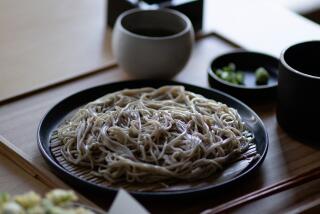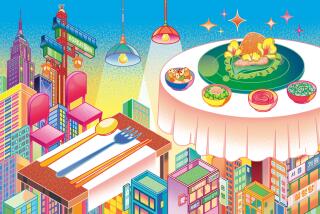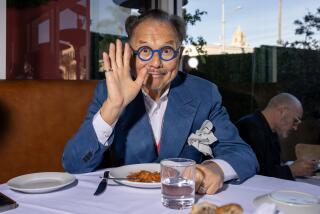Review: ‘Wa-shoku: Beyond Sushi’ a paean to Japanese food culture
If a single theme comes through in the documentary “Wa-shoku: Beyond Sushi,” it’s the importance of presentation in Japanese cuisine.
Director Junichi Suzuki might have taken a tip or two from the chefs and experts he interviewed. Jumping among topics, locations and talking heads, his film begins to resemble an overstuffed platter from an all-you-can-eat buffet rather than one of the elegant morsels he showcases in mouth-watering close-up.
Japan’s traditional dietary culture, or wa-shoku, is about much more than chow; UNESCO has placed this expression of aesthetics and the seasons on its List of Intangible Cultural Heritage in Need of Urgent Safeguarding. As disorganized as Suzuki’s treatment of the subject is, he gets across the idea of centuries-old traditions and the passions they inspire. Beyond sushi, sidebars cover tofu and sake, visits to Tokyo’s fish market and brief discussions on the animism of Shinto and the flavor profile of umami.
In many ways, this is an L.A. story — a story of the city’s ongoing cultural fusion. Suzuki (“Toyo’s Camera”) anchors it with profiles of figures who have played key roles in the stateside popularization of Japanese cuisine: chefs Nobuyuki “Nobu” Matsuhisa and Katsuya Uechi and nonagenarian food importer Noritoshi Kanai, who is often credited for introducing sushi to the West in the 1960s. The disjointed story of Kanai’s partnership with Harry Wolff and their Little Tokyo restaurant, Kawafuku, typifies Suzuki’s approach.
But despite its clumsiness, the film conveys the melding of modern and ancient, sensuous and sacred: On the one hand the foodie-fave Ramen Burger, on the other a chef’s paean to the “rhythm” of a bowl of ramen.
------------
“Wa-shoku: Beyond Sushi.”
MPAA rating: None. In Japanese and English with subtitles.
Running time: 1 hour, 47 minutes.
Playing: Laemmle’s Playhouse 7, Pasadena.
More to Read
Only good movies
Get the Indie Focus newsletter, Mark Olsen's weekly guide to the world of cinema.
You may occasionally receive promotional content from the Los Angeles Times.






